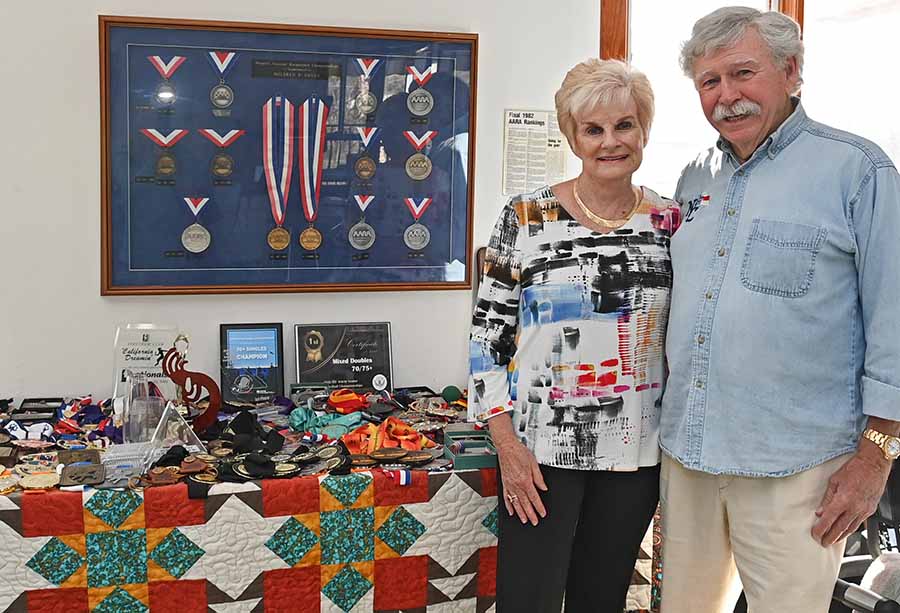Blazing trails comes naturally to Charlotte College alumna Mildred Gwinn
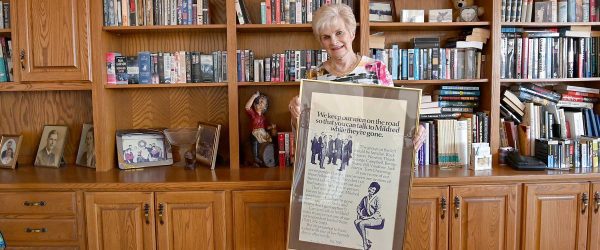
Charlotte College alumna Mildred Hunter Gwinn ’62 personifies persistence and a fierce competitiveness that has served her well, not only in business, but wherever her passion leads.
Banking throughout most of the 20th century was a male-dominated profession, but that didn’t stop Gwinn from becoming one of NCNB’s first female vice presidents. That same determination led her to sue the Charlotte YMCA to access its courts to play racquetball with her husband, Bill ’71, whom she married in 1968.
Today, she is a renowned player, with hundreds of first-place racquetball tournament titles, national and international, in virtually every age category. A member of the International Masters Racquetball Hall of Fame, she currently is ranked No. 1 in her age group. Additionally, she is a champion quilter with numerous first places in competition.
Together, the Gwinns have enjoyed extraordinary lives: snow skiing in the western United States, primarily in Colorado, and building a cadre of friends through church and volunteer opportunities. Pre-COVID, they hosted 200-plus guests every New Year’s Day for a full meal featuring 30-plus of Mildred’s homemade desserts. There have been blips along the way. Both have had major surgeries; for Mildred, there have been 17, including three related to cancer, but as they observed, what they endured just made them stronger.
From these beginnings
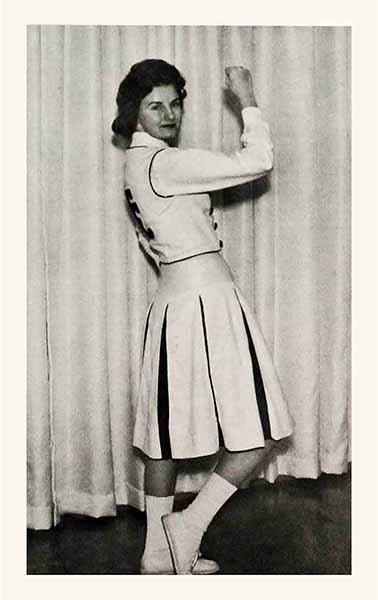 Raised on a farm in Mecklenburg County, Mildred Ann Hunter Gwinn was among the first students to enroll at Charlotte College’s permanent campus in what is now University City.
Raised on a farm in Mecklenburg County, Mildred Ann Hunter Gwinn was among the first students to enroll at Charlotte College’s permanent campus in what is now University City.
The North Mecklenburg High School graduate worked full time during the day and attended classes at night. She even had time for extracurricular activities, serving as head cheerleader for the Owls/49ers basketball team. But first and foremost, Gwinn concentrated on her scholastic pursuits, earning straight A’s and winning the Bill Mitchell Award, given to the top male and female Charlotte College graduates for outstanding scholarship and leadership qualities.
“There were only the two buildings back then, and I would drive out at night,” said Gwinn “We were a close-knit group of students, and it was a really great experience.”
Charlotte College, however, was still a two-year institution. Armed with an associate degree and a $500 scholarship from the college, Gwinn transferred to UNC Chapel Hill, where she earned a bachelor’s degree in May 1964 and played on the women’s basketball team while there. Despite being advised to pursue a teaching career, Gwinn returned to Charlotte to take a secretarial position with NCNB (now Bank of America).
Exploring the continental United States
Before settling into the workforce, Gwinn and a girlfriend decided to blaze a trail across the United States and Canada to see the sights. Gwinn had heard about a new convenience, a gas card, and thought it would be an ideal way to fund the trip and pay for it upon returning to Charlotte.
“I walked into the Esso building on Park Road and asked for a card,” explained Gwinn. “I told the gentleman that I had just graduated college and wanted to take this trip, and I needed the card the next day. I said I’d pay it back in October when I returned, and you know what? I got it.”
Two young women traveling together, camping along the way, was virtually unheard of during the early 1960s. But they set out in Gwinn’s Chevrolet Impala, meandering through 47 states and parts of Canada.
“At the outset, we would stop along the highway to read all the historical markers. Eventually, we slowed down to read the top line, and later we’d just say, there’s one,” said Gwinn. “But it really was like another semester of school, with the chance to see so many places and meet people from all over the country.”
Climbing the banking ladder
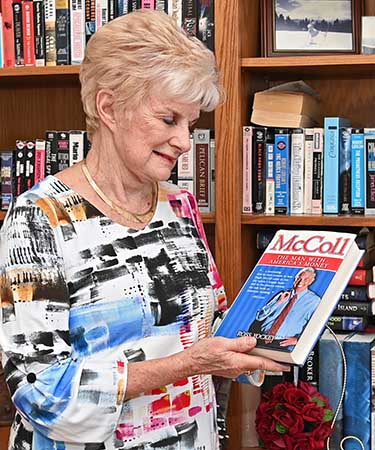 Back in Charlotte, Gwinn joined North Carolina National Bank in a secretarial role alongside assistant cashier Hugh McColl, who eventually would become the legendary leader of NCNB, now Bank of America.
Back in Charlotte, Gwinn joined North Carolina National Bank in a secretarial role alongside assistant cashier Hugh McColl, who eventually would become the legendary leader of NCNB, now Bank of America.
During a 24-year career with the bank, Gwinn held numerous positions before securing the chance to become a loan officer. She considers McColl a mentor who was integral to her career advancement.
“He believed in me and gave me opportunities to advance as a woman in the banking industry,” said Gwinn. “He was very upfront, and when I moved into my first supervisory position, he said, ‘Mildred, you’re going to have people working for you. Listen to everyone and give people credit for their ideas, they may have a better way.’ I followed that advice throughout my career.”
On the second floor of her custom-designed, Mediterranean-style Wesley Chapel home, Gwinn has a framed poster of an NCNB ad in which she is featured. The headline is “We keep our men on the road so that you can talk to Mildred while they’re gone.”
The ad illustrates how women had virtually no customer contact for loans, particularly in the division that dealt with lending to national companies. But Gwinn wanted to shatter that glass ceiling, and after supplementing her bachelor’s degree with business courses from UNC Charlotte, she turned to McColl.
Gwinn recalled asking him to meet over coffee one morning. She said, “There’s a job opening that I’d like to have, and I know you’re going to pick the person for it. He asked me why I should have it, and we went back and forth for a while, but I made my case, and he finally relented.”
She completed credit training and went on to make commercial loans in Charlotte before retiring, and McColl, later, would be recognized for his leadership in authorizing workplace policies benefiting women.
Taking a stand for equal access
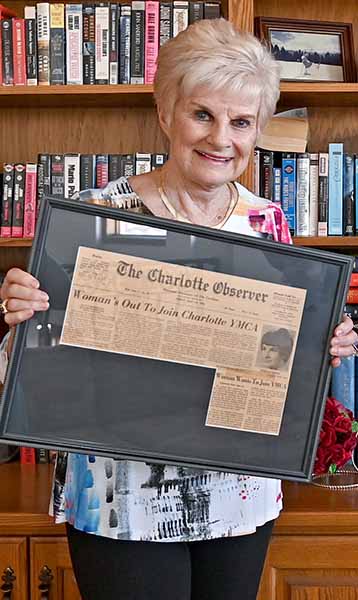 In the late 1960s, Bill Gwinn, the nontraditional UNC Charlotte undergrad, started playing racquetball on a makeshift campus court and introduced Mildred to the sport. After graduation, he joined the Charlotte YMCA (now the Dowd YMCA), a men’s-only facility.
In the late 1960s, Bill Gwinn, the nontraditional UNC Charlotte undergrad, started playing racquetball on a makeshift campus court and introduced Mildred to the sport. After graduation, he joined the Charlotte YMCA (now the Dowd YMCA), a men’s-only facility.
Mildred Gwinn wanted to join the “Y” to compete alongside her husband and applied to be a member, but, as a woman, was rejected.
“I wasn’t trying to make a statement; I just wanted access to the courts,” said Gwinn. “Because the YMCA received public funding, I knew it was a case of discrimination.”
She hired attorneys Durant Escott and Thomas Ray, who filed a lawsuit against the YMCA, which eventually negotiated a settlement enabling Mildred to become the Charlotte YMCA’s first female member.
The Charlotte Observer banner headline article “Woman Out to Join Charlotte YMCA” from May 1976 chronicled Gwinn’s fight.
A persistent push
Bill and Mildred Gwinn first met in Miss Wilson’s second-grade class at Derita Elementary School but with school redistricting, they wouldn’t see one another until Charlotte College. While Mildred Gwinn excelled academically, Bill Gwinn struggled, eventually withdrawing, although not officially.
The couple wed in 1968, and Bill, who worked various jobs, was intent on becoming a member of the ski patrol in the mountains. A broken leg dashed those plans, so after a six-month recovery, he buckled down on his second chance in college, now UNC Charlotte, completing a bachelor’s degree in business with a 3.68 GPA.
To facilitate Bill’s return to the University, Mildred Gwinn implored Bonnie Cone, who was vice chancellor for student affairs and community relations after serving as Charlotte College president, to intervene. All those incomplete marks from Charlotte College thwarted Bill’s reenrollment. In her letter to Cone, Mildred guaranteed her husband would graduate this time, given another opportunity, because she would see to it. Cone granted the request.
“Miss Bonnie was known for her love of students; she really, truly wanted us to finish our education so we could pursue opportunities to improve our futures,” said Gwinn. “Her desire to help students was palpable, you could almost feel it when you talked to her.”
Taking advantage of opportunity
Charlotte was a gateway for the Gwinns. Higher education opened a world of unlimited possibilities, and, for Bill especially, he graduated UNC Charlotte with an overwhelming self-confidence in his abilities to succeed.
Mildred Gwinn, the banking executive and champion racquetball player, would go on to seemingly excel at whatever she attempted. And Bill Gwinn became an acclaimed sales representative with A-dec, the nation’s largest manufacturer of dental equipment. During his nearly 40-year career, he would pioneer sales to the federal government, which led to his traveling to military installations worldwide.
Their story of professional and personal achievements is one shared by countless 49ers who seized the opportunity to obtain a college degree and become lifelong learners. It, too, is a fitting tribute to the legacy of Bonnie Cone, a guiding star who championed access to higher education and envisioned Charlotte as home to an exceptional four-year university, and 75 years later, that legacy thrives in North Carolina’s largest city.
